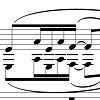for full orchestra; length: 11:03

The band is me using Sibelius notation software, plus Garritan Personal Orchestra.
Story behind the song
MP3 Notes: Creative Labs X-FI Fatality. Sequencer: Sibelius 4. MidiFont: Kontakt Player Gold (Sibelius Ed.).
About this piece: written between 26 Oct. & 24 Nov 2006. Composed in Sibelius 4 and played using Kontakt Gold.
"Sea Changes" started life on 26 October 2006 as a trumpet piece (listen to the MP3, above) to demonstrate for a fellow composer how one might orchestrate a melody. I liked the melody so much, a few days later I decided to go all out and write a full orchestral piece using the melody as the basis.
"Sea Changes" is a symphonic piece that feels, to me, like a movement out of a symphony. Structurally, though, it may bear more resemblance to a theme and variations (but in reverse—more on that, below), in that the melodies heard throughout are all developed out of the final theme (heard in full, 9:17-10:39). Even the very powerful opening and closing section that brackets the whole piece is built from aspects of the main theme. The one exception is the jaunty little theme (hardly more than a motif) heard first in the harp (about 3:48). The harp motif acts as a counter to the main theme (heard initially at about 1:51), adding lightness to what begins as a very introspective and melancholy cello meditation.
Contrary to the idea of a theme and variations, the variations here are put into this piece before the main theme is ever heard in full, and in such a way that it is intended that they give the feeling of developing from the melancholy meditation to the full main theme at the end. Therefore, I guess one might call it variations developing into a theme. The variations also develop from a melancholy mood through lighter and lighter moments to the grand final theme.
"Sea Changes" (a term meaning "a profound or notable transformation") describes the changes of mood within the piece as well as the drastic difference between the versions/variations of the theme heard throughout—esp. the difference between the opening/closing material, the meditation, and the final full theme presentation. It also describes the difference between the origin of this theme (as a little trumpet melody) and the final form it takes here.



